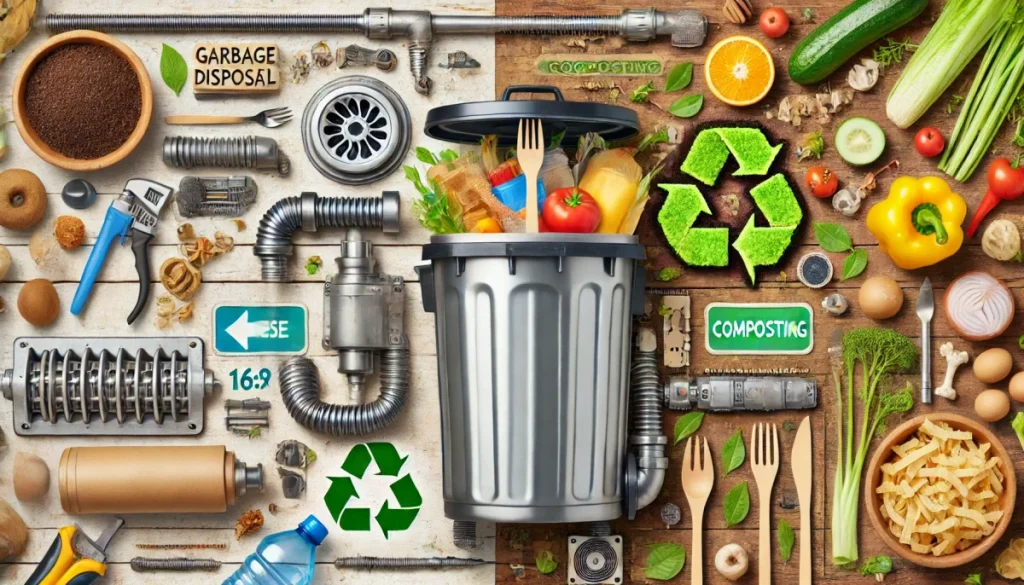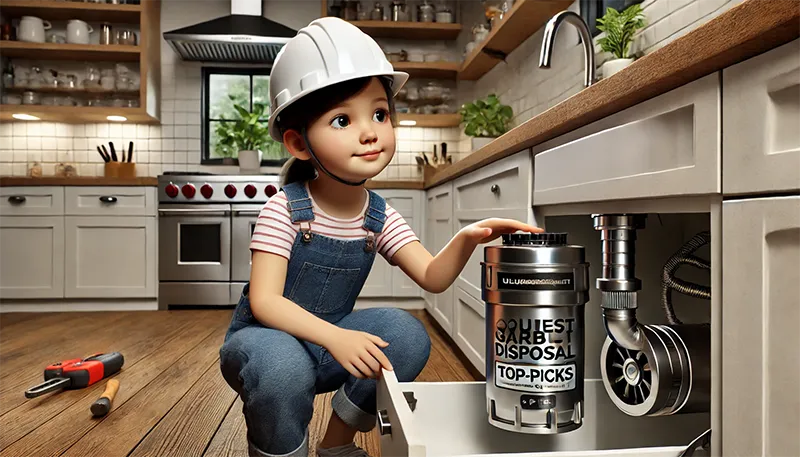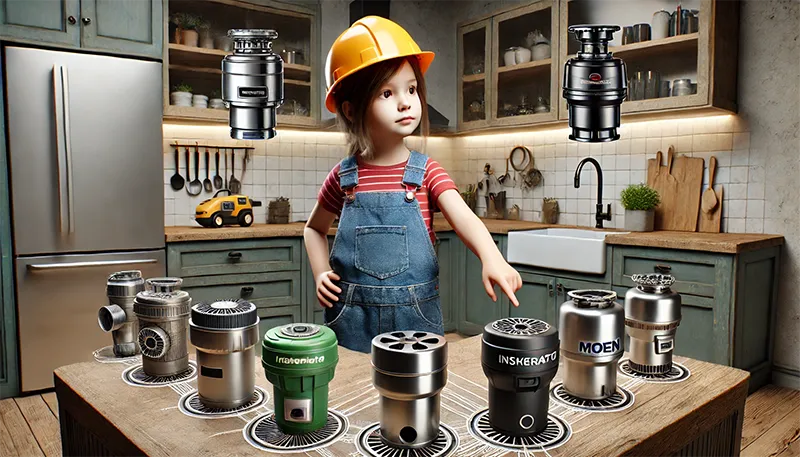When it comes to managing kitchen waste, two common methods come to mind: using a garbage disposal or starting a compost pile.
Each method has its advantages and downsides, and the right choice depends on your priorities—whether you’re focused on convenience, environmental impact, or both.
Garbage disposals provide an easy way to eliminate food waste directly down the drain, while home composting turns organic waste into nutrient-rich soil.
But which option is better for your household? Both methods aim to reduce the amount of waste ending up in landfills, but they do so in very different ways.
In this guide, we’ll take a deep dive into the pros and cons of garbage disposal vs composting, exploring how each method works and how they impact the environment, your home, and your lifestyle.
By the end of this comparison, you’ll be able to make an informed decision on which waste management method is best suited for your needs.
Let’s explore the differences between garbage disposal systems and the composting process to help you make an informed decision.
What is a Garbage Disposal and How Does It Work?
Garbage disposals are convenient kitchen appliances installed under the sink that grind up food scraps, which are then flushed down the drain and sent to the wastewater treatment plant.
This system keeps food waste out of your trash, reducing odors and making kitchen cleanup easier. However, it also means more food waste ends up in the municipal sewage system.
Garbage disposals are powered by electricity, and they work by spinning blades or impellers at high speeds to pulverize food waste into a liquify or finely ground state.
Garbage disposals are convenient because they let you get rid of most soft food waste in a matter of seconds. This can help keep your kitchen cleaner by reducing the amount of food scraps that end up in the trash, which can cause odors and attract pests.
By using a garbage disposal, you can also reduce the volume of waste that ends up in landfills, which helps to limit methane emissions that contribute to climate change.
However, garbage disposals have their limitations. While they’re effective for many types of food waste, there are certain items that shouldn’t go down the drain.
Fibrous vegetables (like celery and asparagus), starchy foods (like rice and pasta), and grease or fats should not be put into a disposal because they can cause clogs or damage the disposal.
Additionally, the disposal requires water to flush the food particles down the drain, which can lead to higher water bills if used frequently.
Garbage disposals also add strain to sewage systems, as the waste they process must be treated at water treatment plants.
While it’s a step up from sending food waste directly to landfills, the environmental impact of operating a garbage disposal—through water usage, electricity consumption, and strain on sewage systems—must be considered.
The wastewater treatment plant plays a critical role here. While it processes the food waste from your garbage disposal, it must deal with the extra load of solid waste, which can increase the energy demands of the plant.
This means that although garbage disposals are convenient, they may not always be the most eco-friendly choice.
What is Composting and How Does It Work?
On the other hand, the composting process is a natural way to recycle food scraps. When you compost, organic material like fruit peels, vegetable scraps, and coffee grounds are broken down by microorganisms, turning into nutrient-rich soil.
This method not only reduces the amount of solid waste sent to landfills but also benefits your garden. Composting can take place in a controlled environment (like a backyard bin) or happen naturally in larger-scale municipal composting programs.
When you compost, you’re allowing organic material to decompose in the presence of oxygen. This aerobic process prevents methane emissions (which occur in landfills when waste decomposes without oxygen) and instead produces carbon dioxide and water, which are far less harmful to the environment.
Home composting can handle most organic waste, including fruit and vegetable scraps, coffee grounds, eggshells, and even some paper products like paper towels or cardboard.
Composting offers numerous environmental benefits. First, it keeps organic waste out of landfills, reducing the amount of methane gas released into the atmosphere. Second, composting returns valuable nutrients to the soil, improving soil structure, fertility, and water retention.
Gardeners and landscapers often use compost as a natural fertilizer, avoiding the need for chemical alternatives that can harm the environment.
There are several types of composting, including traditional backyard composting, which involves creating a compost pile or using a compost bin.
Vermicomposting, which uses worms to break down organic matter in a small bin (ideal for apartment living); and municipal composting programs, where cities collect organic waste from residents for centralized composting.
Each method has its own pros and cons, depending on space availability, the volume of waste produced, and how much time you’re willing to dedicate to managing the process.
However, composting requires time and effort. You need to maintain the right balance of “greens” (food scraps and other nitrogen-rich materials) and “browns” (carbon-rich materials like leaves and paper) to ensure efficient decomposition.
Composting can also take weeks or months to produce usable compost, depending on the method and how well it’s maintained. For some households, this process may seem slow compared to the instant disposal option that garbage disposals provide.
The composting process requires some time and effort, as you’ll need to maintain the proper balance of green and brown materials, as well as manage moisture and aeration.
However, composting offers a sustainable way to manage food waste without contributing to the load at the wastewater treatment plant.
Garbage Disposal vs Composting: Pros and Cons
Now that we’ve explored how both methods work, let’s dive into the pros and cons of garbage disposal vs composting to help you determine which is best for your home.
Pros of Garbage Disposal
- Quick and Convenient: One of the biggest advantages of a garbage disposal is its convenience. Instead of collecting food scraps in a bin or bag, you can simply grind them down the drain. This is especially helpful for busy households where time is of the essence.
- Reduces Kitchen Odors: Food waste in a garbage can quickly leads to unpleasant smells and attracts pests. By using a garbage disposal, you can eliminate food waste immediately, helping to keep your kitchen cleaner and fresher.
- Minimal Maintenance: Garbage disposals are relatively low-maintenance. As long as you avoid putting problematic items (like grease and fibrous vegetables) into the disposal and clean it regularly, it should function well for many years.
Cons of Garbage Disposal
- Limited to Certain Foods: Garbage disposals aren’t designed to handle all food waste. Items like grease, starchy foods, and large bones can cause clogs or damage the blades. This limits the types of waste you can process, meaning some food scraps will still need to go in the trash.
- Environmental Impact: While garbage disposals keep food waste out of landfills, they still have an environmental cost. Running the disposal requires electricity, and it uses water to flush the waste down the drain. Additionally, the food waste that goes down the disposal must be processed by municipal sewage treatment plants, adding strain to those systems.
- Potential Plumbing Issues: Over time, frequent use of a garbage disposal can lead to clogged pipes, especially if items that don’t belong in the disposal are put down the drain. Grease and fats are particularly notorious for causing clogs, as they solidify when cooled.
Pros of Composting
- Environmentally Friendly: Composting is one of the most eco-friendly ways to dispose of organic waste. By composting, you divert food scraps from landfills, where they would produce methane (a potent greenhouse gas). Instead, you turn waste into valuable compost that can nourish soil and reduce the need for chemical fertilizers.
- Nutrient-Rich Fertilizer: Composting creates humus, a natural fertilizer that enriches the soil. It’s packed with nutrients that improve soil health, increase water retention, and support plant growth. This makes composting a great option for gardeners and landscapers.
- Processes Almost All Organic Waste: Composting can handle a wider variety of organic waste than garbage disposals, including fruit and vegetable scraps, coffee grounds, eggshells, and paper products. This means less waste goes into your trash bin or down your sink.
Cons of Composting
- Takes Time and Space: Composting isn’t an instant process. Depending on the method, it can take weeks or months for organic waste to fully decompose into usable compost. Additionally, composting requires space, particularly for backyard composting, which may not be feasible for everyone.
- Requires Regular Maintenance: A compost bin needs to be maintained carefully to ensure proper decomposition. This involves managing the balance of “greens” and “browns,” turning the compost pile to aerate it, and ensuring it stays moist. If not managed properly, composting bins can produce odors or attract pests.
- Not As Convenient: Compared to garbage disposals, composting requires more effort and planning. Instead of instantly grinding food waste down the drain, you’ll need to collect scraps, monitor your compost bin, and wait for the material to break down.
Which Option is Better for the Environment?
When comparing garbage disposal vs composting from an environmental perspective, composting is the clear winner. The composting process helps keep organic waste out of landfills, which reduces methane emissions.
Methane is a potent greenhouse gas that contributes significantly to global warming, and landfills are one of its largest sources.
By composting, you reduce the volume of waste sent to landfills and instead create a valuable resource that can improve soil health.
The compost you produce can be used in your garden, added to your lawn, or donated to community gardens. Composting also eliminates the need for chemical fertilizers, which are often harmful to the environment and water systems.
On the other hand, using a garbage disposal sends food waste to the wastewater treatment plant, where it can increase the amount of solid waste the facility needs to process. This can lead to higher energy use and potential strain on water treatment infrastructure.
In terms of sustainability, composting is the more eco-friendly choice. It not only reduces landfill waste but also provides direct benefits to the environment by enriching the soil and supporting plant growth. If reducing your carbon footprint and creating less waste is your goal, composting is the superior option.
Which Option Is Best for You?
The best option depends on your priorities. If you’re looking for convenience and quick disposal of food scraps, a garbage disposal might be the right choice for your kitchen.
However, if you’re environmentally conscious and willing to take part in the composting process, you can reduce your impact on wastewater treatment plants and make a positive contribution to waste reduction.
Ultimately, both systems offer benefits, but the composting process is often seen as the more sustainable option, particularly for those who want to reduce their home’s carbon footprint.
Combining Both Methods for Maximum Efficiency
For many households, the best solution may be to combine both methods—using a garbage disposal for convenience and composting for environmental benefits.
This hybrid approach allows you to efficiently manage kitchen waste while minimizing the amount of waste that goes to landfills or sewage treatment plants.
You can use your garbage disposal for food waste that isn’t suitable for composting, such as small amounts of liquid waste, cooked foods, or soft food scraps.
Meanwhile, you can compost the majority of your organic waste, including vegetable peels, coffee grounds, eggshells, and yard trimmings. This way, you’ll reduce the strain on your garbage disposal and make the most of your composting system.
This hybrid approach works especially well for people who are new to composting or who don’t have enough space for a large composting operation.
By composting what you can and using the garbage disposal for the rest, you strike a balance between convenience and environmental responsibility.
FAQs
-
Can I use both a garbage disposal and composting?
Yes, many households use both methods to handle food waste efficiently. Composting is ideal for most organic waste, while the garbage disposal can be used for items that can’t be composted, like meat scraps and certain cooked foods.
-
Which is better for apartment living: garbage disposal or composting?
Garbage disposals are typically more convenient for apartment dwellers because they don’t require outdoor space or maintenance. However, small-scale indoor composting options, such as vermicomposting with worms, are also available and can be managed in an apartment.
-
Is composting smelly or messy?
When managed properly, composting shouldn’t produce unpleasant smells. A well-maintained compost bin needs a balance of “greens” and “browns” to promote aerobic decomposition, which prevents bad odors. Turning the compost regularly helps keep it aerated and prevents the material from becoming slimy or smelly.
-
Does using a garbage disposal increase my water bill?
Yes, using a garbage disposal requires running water to flush food waste down the drain. The more you use it, the more water is required, which can contribute to a higher water bill. For those looking to conserve water, composting is a better option.
-
What kind of food waste is best for composting vs the disposal?
Composting works best for plant-based materials like fruit and vegetable scraps, coffee grounds, eggshells, and paper products. Garbage disposals are better for soft food scraps, small amounts of cooked foods, and liquid waste, but shouldn’t be used for fibrous vegetables, grease, or large bones.
Conclusion
When it comes to managing kitchen waste, the choice between garbage disposal vs composting ultimately depends on your priorities.
Garbage disposals offer quick and easy waste removal for small amounts of food waste but have limitations on what they can process and their environmental impact.
Composting, on the other hand, is a more sustainable option that turns food waste into valuable compost, though it requires more time, space, and effort.
For environmentally conscious households, composting is the clear winner in terms of sustainability. However, many people find that a combination of both methods is the most practical solution, allowing them to reduce waste while still enjoying the convenience of a garbage disposal.
Looking to reduce your kitchen waste? Consider composting for a greener solution, and use a garbage disposal for handling minimal, non-compostable items!



